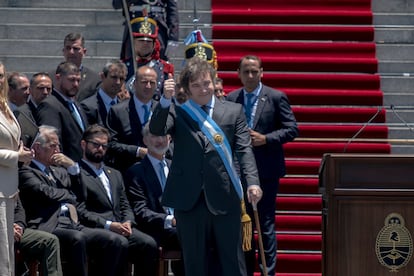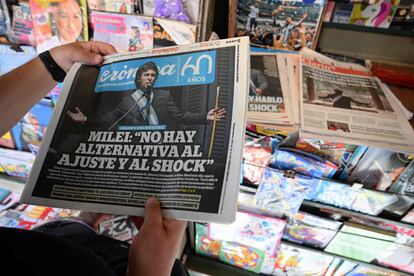Javier Milei’s first week in power: Skyrocketing prices, threats of repression and calm in the financial markets
The transformation promised by the newly-elected far-right Argentine president begins with a devaluation of the currency, as well as the implementation of a new protocol that enables the stronger use of force to quell protests

It’s five in the afternoon in Buenos Aires, on Tuesday, December 12. Paola Orellana — a 51-year-old stylist — is coloring the hair of the only client in her salon. She turns on the television that she has in the corner, raises the volume and warns the second client who enters: “I turned it on to listen to the announcements.” Argentina is in suspense, waiting for the package of measures that the new administration of President Javier Milei will begin implementing. On December 10, the day of his inauguration, from the steps of the Congress, the far-right economist said that, with him, a “new era” is beginning in the country.
Many want to know what the Argentina that they have been promised is going to look like. The intended transformation began this past week, with a devaluation of the currency that caused prices to skyrocket. However, this didn’t shock the financial markets. While the labor and student unions have already begun to announce mass demonstrations, Milei is quickly implementing a new protocol, which will allow the security forces to use harsher measures to repress protests.
Milei’s first week as president started a little late. The neoconservative arrived at the presidential palace on Monday, December 11, for his first cabinet meeting. That day, no significant economic announcements were made, while the Central Bank took a holiday. Later, Milei participated in a Hanukkah celebration — the only moment during his first week in power when he spoke in public. “We know that the forces of heaven are going to support Argentina and Israel at this moment.” He recently converted to Judaism and is now trying to align his country towards the Israeli government.
On Tuesday, at five in the afternoon — for when it was scheduled — the economic package didn’t arrive. Instead, Minister of Economy Luis Caputo appeared on TV two hours late, in a recorded message to communicate the first 10 economic measures proposed by the new government. These include devaluing the peso by 50%, freezing all public works, reducing energy and transportation subsidies, gutting the federal workforce and imposing a 15% tax on exports. Caputo is aiming to bring inflation down to 20% or 30% monthly, while increasing tax revenue. There appears to be no proposal to compensate the population for the devaluation of their savings, although two social benefit programs — which reach 40% of the population that lives in poverty — will be improved.
The most visible consequences began to be seen 24 hours after the announcement. The markets responded calmly. The country’s risk rating fell and the dollar — which circulates illegally and is a thermometer for the local economy — was quoted at 1,070 pesos per U.S. unit… only 7% more than the previous day. Still, prices skyrocketed. Merchants across the country began receiving messages from their suppliers, announcing price increases of up to 175% in some cases. Lumberyards halted all sales. A pound of meat began to cost 40% more. The oil company Shell raised the price of fuel by 37%, while Aerolíneas Argentinas — the country’s largest airline — adjusted the price of tickets by 100%.

On the streets of Buenos Aires, prices monopolized the conversations. A man sent a WhatsApp voice note to his wife on Thursday, 48 hours after the announcement: “There are no prices [available] until the afternoon.” Two women on the sidewalk couldn’t agree on the value of their groceries: “I bought a sweet bread, two [bottles of] milk, oil, a bag of sugar and an alfajor… I spent 5,000 pesos,” one said. The other replied: “It doesn’t seem like that much compared to what I spent at the perfume shop.” Another woman vented to a merchant: “It’s a ripoff, it’s distressing.”
The local newspapers also echoed the news. In the province of Río Negro, in Patagonia, it was reported that “1,230 homes and 26 schools” would stop being built. In Misiones — in the tropical northeast of the country — it was said that the tourism sector (one of the most important economic engines in the province) remained “on alert” in the face of the announced measures. In Córdoba and Santa Fe, in the middle of Argentina, farmers and businesspeople were divided between criticism and support of the government’s measures.
Minister Caputo — who previously oversaw the Ministry of Economy between 2017 and 2018 — was crowned by the media as “person of the week.” He gave his first television interview to offer some details about the package, because there were — and still are — missing details. In the following days, he also warned that dollarization and the closure of the Central Bank continue to be goals… although the rest of the government remained practically silent. Without uttering a word in public, Milei continued to share positive reactions to the new measures on social media. Minister Sandra Pettovello — head of the newly-created Ministry of Human Capital — also didn’t speak out when the first questions about the economic adjustment appeared. However, during the campaign, Milei said that she would be the only minister who would have carte blanche to offer financial support “to the fallen,” referring to Argentines who would be devastated by the economic shock treatment.
Between worry and hope
During the campaign, Milei warned that, if he came to power, he would make a big change. During his inauguration on December 10, he reminded his followers of this, as they listened in silence. He justified his decisions by affirming that Argentina is heading towards inflationary “catastrophe” and that “there’s no alternative solution to adjustment and [economic] shock.” This was a warning to prepare for difficult times.
“We’re hopeful that he has a clear idea of where we’re going,” says Fernando, a 53-year-old merchant. “It will be difficult, it won’t be pleasant, but we’re happy, even if we have to push ourselves.”
Others are more concerned. Luis, a 70-year-old retiree, tells EL PAÍS that he will have to start saving for food. The pension he receives is around 130,000 pesos ($150) a month, or half the value needed to buy groceries for a single person. He still doesn’t know how much he will receive next month. Silvia — a 37-year-old employee — is concerned about the “abysmal” increase in the cost of living, because her salary “doesn’t match” the rising prices. She believes that one of the biggest impacts will be seen in the increase in the price of public transportation, when state subsidies disappear in January.

Among the economists interviewed by EL PAÍS, there’s consensus that the situation in Argentina is critical. But the experts also warn of the impact that the measures taken by the government will have on the population. “This is a classic adjustment: all it does is lower salaries and doesn’t stabilize” the economy, laments Florencia Medici, a researcher at the National Council for Scientific and Technical Research (CONICET). Leandro Mora Alfonsín — an economist and professor at the University of Buenos Aires — also points out the “total absence of an income-adjustment policy.”
Unions and social movements have also warned that the chosen course will ruin Argentines. The General Workers’ Union (CGT) — the main labor organization in Argentina — convoked an urgent meeting following the government’s announcement and issued a statement, in which it warned that the macroeconomic “adjustment is being paid for by the people” and that the unions “will not sit idly by.” The left-wing organizations have called for a strike and a “massive” rally in the Plaza de Mayo on December 20.
“They should know that, if they take to the streets, there will be consequences,” was the government’s response. Minister of Security Patricia Bullrich — who held the same portfolio during President Mauricio Macri’s administration, from 2015 until 2019 — announced a tough plan against the protests. After Caputo, she became another protagonist of the week.
The new protocol against demonstrations plans to call on the four branches of the security forces that depend on the Ministry of Security — the Federal Police, the National Gendarmerie, the Naval Prefecture and the Airport Security Police — to break up demonstrations that block streets and critical routes. “They will use necessary and sufficient force, which will be [increased] in proportion to the resistance,” Bullrich warned.

To this end, the new minister repealed the rules related to police action, which were passed during the administration of former president Cristina Kirchner (2007-2015) to limit repression, following the deaths of two people during a 2010 police operation. “Now, rather than a limitation on the use of police force, there’s authorization to exercise violence against protesters,” criticized the Center for Legal and Social Studies (CELS). There was also a reaction from social movements and some sectors of the opposition. The leftist legislator Myriam Bregman — who considers the decision to be “absolutely unconstitutional” — has received threats on social media. “Jail or a bullet,” right-wing legislator José Luis Espert tweeted out. He’s a former ally of the president.
Other parts of the new government’s plans are slowly coming to light. A decree has been made regarding the necessity and urgency of deregulating the economy. The state’s fleet of vehicles is set to be reduced, while two airplanes belonging to the state-owned oil company will be sold off. There’s a proposal to crack down on money-laundering and several ambassadors are about to be replaced. The far-right ruling party, meanwhile, has managed to gain the presidency of the Senate, by cobbling together a coalition with the center-right parties.
Manuel Adorni — the president’s spokesman — has been using his morning press conference to insist that many more measures will be announced “in the coming weeks.” He has also emphasized the proposed reforms will address “deep” issues within the economy. While President Milei has refrained from speaking too much in public, he has participated in all cabinet meetings, reiterating his support for Ministers Caputo and Bullrich.
On Friday, December 15, at noon, the president went live on Instagram, recording from his office. His sister, Karina Milei — now general secretary of the presidency — and a group of young people accompanied him. More than 115,000 viewers watched as he showed his dogs’ faces and raffled off his final salary as a legislator (he was elected to Congress in 2021). “Now, I have a new job,” Milei grinned. For a week now, the far-right former TV panelist has been sitting in the president’s chair.
Sign up for our weekly newsletter to get more English-language news coverage from EL PAÍS USA Edition
Tu suscripción se está usando en otro dispositivo
¿Quieres añadir otro usuario a tu suscripción?
Si continúas leyendo en este dispositivo, no se podrá leer en el otro.
FlechaTu suscripción se está usando en otro dispositivo y solo puedes acceder a EL PAÍS desde un dispositivo a la vez.
Si quieres compartir tu cuenta, cambia tu suscripción a la modalidad Premium, así podrás añadir otro usuario. Cada uno accederá con su propia cuenta de email, lo que os permitirá personalizar vuestra experiencia en EL PAÍS.
¿Tienes una suscripción de empresa? Accede aquí para contratar más cuentas.
En el caso de no saber quién está usando tu cuenta, te recomendamos cambiar tu contraseña aquí.
Si decides continuar compartiendo tu cuenta, este mensaje se mostrará en tu dispositivo y en el de la otra persona que está usando tu cuenta de forma indefinida, afectando a tu experiencia de lectura. Puedes consultar aquí los términos y condiciones de la suscripción digital.








































